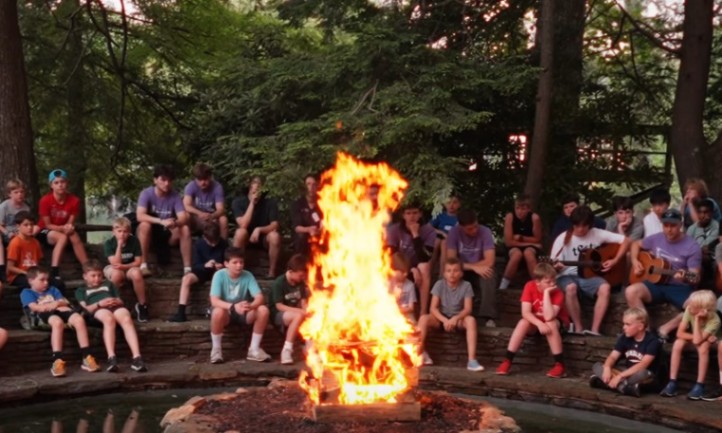If your goal is to send your child to a camp where they spend more time outside than indoors, the best options are those that combine hiking, canoeing, and outdoor exploration into their daily routines.
These camps stand out because they are built around nature immersion, not just a few token outdoor activities. The most highly regarded programs are often located near lakes, rivers, or in protected forests, where the environment itself becomes the classroom.
Camps in states like Minnesota, Maine, Colorado, North Carolina, and Wisconsin have consistently ranked among the best for combining wilderness skills, water sports, and hiking adventures.
1. Camp Widjiwagan – Ely, Minnesota
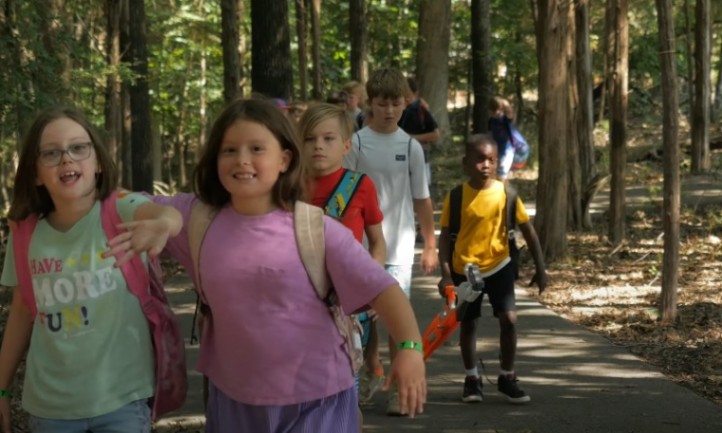
Camp Widjiwagan has been running since 1929 and is considered one of the best wilderness tripping camps in the U.S. Located at the edge of the Boundary Waters Canoe Area Wilderness (BWCAW), it gives campers access to more than a million acres of interconnected lakes and forests.
A typical session includes multi-day canoe expeditions where campers paddle across lakes, carry canoes across portage trails, and set up remote campsites. Older campers may venture as far as Quetico Provincial Park in Canada. Safety is paramount: every trip is led by experienced guides trained in wilderness first aid, water safety, and backcountry navigation.
Daily life at camp balances base-camp activities (like swimming, ecology workshops, and climbing walls) with trip preparation—packing gear, food rationing, and map reading. Campers learn Leave No Trace ethics and how to live with minimal impact on the environment.
- Cost: Sessions typically run from $2,500 to $5,000, depending on length.
- Facilities: Rustic cabins, dining hall, and access to YMCA-trained staff.
- Ideal for: Teens who are ready for real adventure and parents seeking a program with strong values around resilience and independence.
2. Camp Chewonki – Wiscasset, Maine
Chewonki was founded in 1915 and is located on a 400-acre peninsula along the Maine coast. The camp offers a rich blend of canoe tripping, backpacking, and environmental education.
What makes Chewonki unique is its strong connection to ecology. Campers take part in hands-on activities like working on the Chewonki farm (milking cows, collecting eggs, harvesting vegetables) and studying coastal wildlife in marine labs. The canoeing program includes extended expeditions on the Allagash Wilderness Waterway—a 92-mile stretch of Maine rivers and lakes—and multi-day backpacking in Baxter State Park.
Days often begin with chores and morning swims, followed by skill sessions (canoe strokes, orienteering, knot tying). Afternoons are for exploring trails or rivers. Evenings center on campfires and group reflection.
- Cost: $3,500–$6,500 depending on trip length.
- Facilities: Cabins, yurts, a working farm, and waterfront access.
- Ideal for: Families looking for a balance between traditional camp fun and a deep environmental education.
3. Sanborn Western Camps – Florissant, Colorado
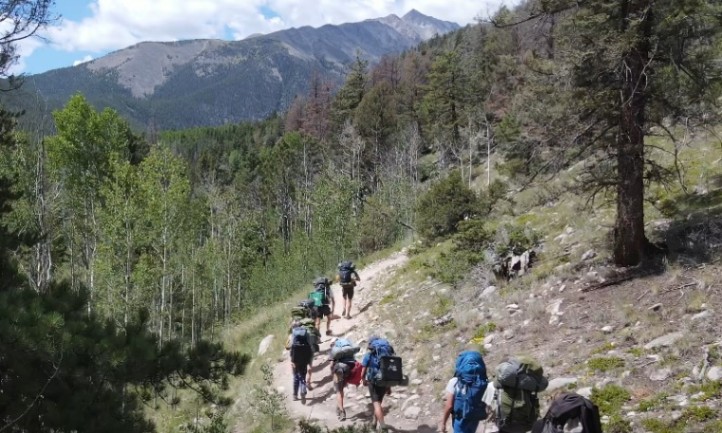
Set on 6,000 private acres in the Rockies, Sanborn Western Camps are divided into two sites: High Trails Ranch for girls and Big Spring Ranch for boys.
The program emphasizes mountain exploration. Campers go on day hikes and multi-day backpacking trips to places like Pikes Peak, the Collegiate Peaks, and the Great Sand Dunes. Canoeing happens on alpine lakes and nearby reservoirs, while rock climbing and horseback riding give kids a wide skill set.
Sanborn also focuses on leadership and team-building. Trips are carefully scaled: younger campers start with overnight hikes, while older teens may summit 14,000-foot peaks or embark on 5-day canoe expeditions. Staff are trained in altitude safety and outdoor risk management.
Because of the rugged conditions, proper gear is emphasized from day one. Campers are encouraged to bring durable clothing that can handle tough trails, unpredictable weather, and frequent activity. For example, tactical pants are often recommended because they combine flexibility, quick-dry materials, and multiple pockets — perfect for keeping essentials handy during long hikes and canoe portages.
- Cost: $3,400–$6,800 per session.
- Facilities: Rustic cabins, ropes courses, a riding arena, and climbing towers.
- Ideal for: Kids who want mountain adventure with variety—hiking, climbing, and paddling all rolled into one
4. Camp Mondamin – Tuxedo, North Carolina
View this post on Instagram
Founded in 1922 in the Blue Ridge Mountains, Camp Mondamin has a philosophy of camper choice. Instead of rigid schedules, kids choose their activities daily, whether it’s canoeing, kayaking, mountain biking, or hiking.
Outdoor exploration is core: Mondamin runs frequent overnight trips into Pisgah National Forest and the Great Smoky Mountains. Canoeing sessions prepare kids for river expeditions, and backpacking trips range from easy overnights to 3–4 day treks.
The camp is known for its mentorship culture. Older campers and staff model responsibility and independence, while younger kids are encouraged to take ownership of their choices.
- Cost: About $3,200–$6,200 for 3–6 week sessions.
- Facilities: Cabins, waterfront on Lake Summit, and ropes challenge courses.
- Ideal for: Families who want a camp that encourages independence and flexible exploration rather than a rigid schedule.
5. North Star Camp – Hayward, Wisconsin
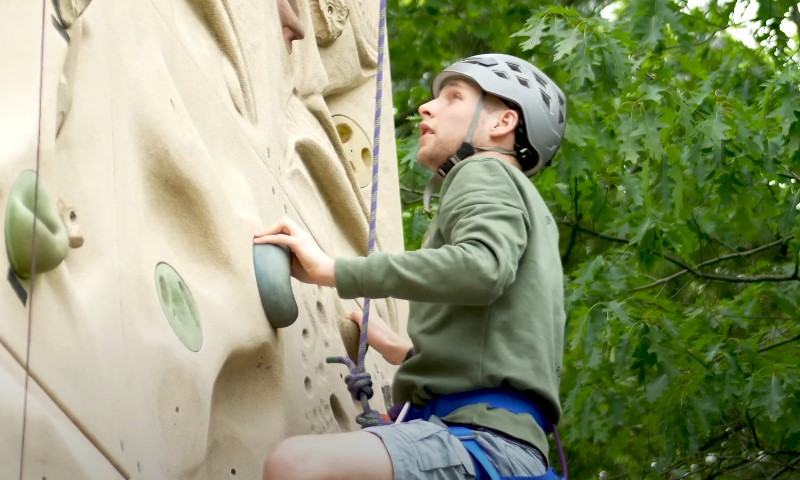
North Star, founded in 1945, is a smaller community camp (around 250 campers per session) that emphasizes both tradition and outdoor trips.
The canoe program begins with short lake trips and builds to multi-day expeditions into the Boundary Waters for older boys. Hiking and wilderness camping are central, but the camp also mixes in archery, swimming, and campfire traditions to create balance.
The camp prides itself on its non-competitive environment—there are no scores, rankings, or competition-heavy programs. Instead, kids are encouraged to try new things at their own pace.
- Cost: $2,900–$5,800, depending on length.
- Facilities: Lakeside cabins, athletic fields, and woodworking shops.
- Ideal for: Families who want a tight-knit, tradition-rich camp with real wilderness trips but also a strong community focus.
6. Keewaydin Camp – Salisbury, Vermont
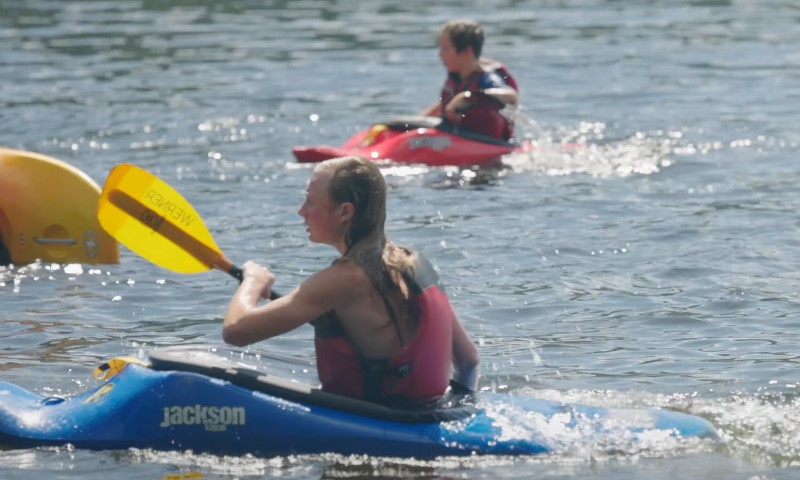
Founded in 1893, Keewaydin is one of the oldest camps in North America and has built its identity around canoe expeditions. Located on Lake Dunmore, the camp organizes trips that may last up to two weeks, venturing into Vermont, Quebec, and Ontario wilderness areas.
The philosophy is simple: expedition tripping teaches self-reliance. Campers carry their own gear, cook meals over campfires, and learn wilderness navigation. While days are spent paddling and portaging, evenings are about setting up campsites, telling stories, and bonding in small groups.
Back at base, Keewaydin offers swimming, sailing, and woodcraft. Its alumni network is famously loyal, with generations of families returning year after year.
- Cost: $4,000–$7,000 7,00,0 depending on trip intensity.
- Facilities: Historic cabins, boathouse, and extensive tripping equipment.
- Ideal for: Parents who want their child to experience traditional expedition-style camping with deep historical roots.
Bottom Line
If you want a camp where kids truly step away from screens and into the wild, the best choices are those rooted in real wilderness traditions. Camps like Widjiwagan in Minnesota, Chewonki in Maine, Sanborn in Colorado, Mondamin in North Carolina, North Star in Wisconsin, and Keewaydin in Vermont consistently deliver more than just summer fun — they give children the chance to paddle remote lakes, climb mountain trails, and sleep under the stars.
The difference between these programs and a general recreation camp is depth. At these camps, canoeing trips last days, not hours, hikes lead into true wilderness, not backyard trails, and exploration means learning self-reliance, teamwork, creative thinking, and resilience. Parents looking for value will find that while tuition ranges from roughly $3,000 to $7,000 per summer, the skills, friendships, and confidence children gain last a lifetime.
In short, the best summer camps for hiking, canoeing, and outdoor exploration are the ones where adventure is the foundation, not the extra.

